新目标英语七年级下册Unit 4基础知识(原创)
七下英语第四单元知识点归纳

七下英语第四单元知识点归纳English:In the fourth unit of seventh grade English, students learn about different ways to express future events, such as using will, going to, and present continuous. They also study vocabulary related to school subjects, school events, and future careers. Additionally, students learn how to make predictions using modal verbs like may, might, and could. In terms of grammar, students are introduced to the concept of countable and uncountable nouns, as well as how to use some and any correctly. They also practice using imperatives, such as giving advice or making suggestions. Lastly, students explore the theme of future aspirations and goals, discussing what they hope to achieve in the future and how they plan to make their dreams a reality.中文翻译:在七年级英语的第四单元中,学生学习了表达未来事件的不同方式,例如使用will、going to和现在进行时。
新目标英语七年级下册Unit4知识点

新目标英语七年级下册Unit 4复习知识点归纳的简介:一.短语:1 want to do sth 想要作某事2 give sb sth = give sth to sb 给某人某物 / 把某物给某人3 help sb do sth 帮助某人作某事Eg: I want to help my mother do some housework at home.4 help sb with sth 帮助某人谋事Eg: I want to help my mother with some house work at home5 in the day 在白天6 at night 在晚上7 talk with/ to sb 和----谈话8 be busy doing sth 忙于做某事 Eg: He is busy listening to the teacher.9 in a hospital 在医院l10 work/ study hard 努力工作11 Evening Newspaper 晚报二.重点句式及注意事项:1 询问职业的特殊疑问词是what;有三种主要句式① What + is / are + sb?② What + does/ do + sb + do?③ What + is/ are + 名词所有格/ 形容词性物主代词 + job?2 People give me their money or get their money from me.3 Sometimes I work in the day and sometimes at night.4 I like talking to people.5 I work late. I’m very busy when people go out to dinners.。
七下U4知识清单

七年级下册Unit4 How do you make a banana milk shake? 知识清单一.单词Section Ahake k shake 3.blender 4. turn on 5.peel 6.pour 7.yogurt 8.honey 9.watermelon 10.spoon 11,pot 12.add 13.finally 14.salt 15.sugar 16.cheese 17.popcorn 18.corn 19.machine 20.dig 21.hole1.n.&v. 摇动,抖动2.奶昔3.n. 食物搅拌器4.接通(电流、煤气、水等);打开5.v. 剥皮6.v. 倒出,倾倒7.n. 酸奶8.n. 蜂蜜9.n. 西瓜 10.n. 勺,调羹11.n. 锅 12.v. 增加,添加 13.adv. 最后,最终 14.n. 食盐 15.n. 食糖16.n. 干酪,奶酪 17.n. 爆米花 18.n. 玉米,谷物 19.n. 机器,机械装置20.v. 掘(地),凿(洞),挖(土) 21.n. 洞,孔,坑Section B1.sandwich2.butter3.turkey4.lettuce5.piece6.Thanksgiving7.traditional8.autumn9.traveler 10.England 11.celebrate 12.mix 13.pepper 14.fill 15.oven16.plate 17.cover 18.gravy 19.serve 20.temperature1.n. 夹心面包片;三明治2.n. 黄油3.n. 火鸡4.n. 莴苣;生菜5.n. 片;块;段6.n. 感恩节7..adj. 传统的,惯例的8..n. 秋天,秋季9..n. 漂泊者;旅行者10.英格兰 11.v. 庆祝,庆贺 12.v. (使)混合,融合 13.n. 甜椒,柿子椒v. (使)14.充满,装满 15.n. 烤箱,烤炉 16.n. 盘子,碟子 17.v. 遮盖,覆盖n. 覆盖物,盖子 18.n. (调味)肉汁 19.v. 接待,服务,提供 20.n. 温度,气温,体温二、重要短语和知识点Section A短语1. make a banana milk shake2. turn on3. cut up4. pour...into…5. put...in/into...6. make fruit salad7. cook for another 10 minutes8. one more thing9.add some salt10. one cup of yogurt 11. plant a tree 12. make beef noodles 13. take out1. 制作(一份)香蕉奶昔2. 接通;打开3. 切碎4. 把……倒入……5. 把……放入......6. 制作水果沙拉7. 再煮10分钟8. 还有一件9. 加一些盐10. 一杯酸奶11. 种树12. 制作牛肉面13. 取出;拿出知识点1. Then, add the cabbage, tomatoes and onion and cook for another 10 minutes.然后,加入卷心菜,西红柿和洋葱,再煮10分钟。
七年级英语下册Unit_Dont_eat_in_class_Section_A_新人教新目标

3a. Write the rules for the school library.
Library Rules 1. Don’t talk. 2. Don’t eat. 3. Don’t listen to music. 4. Don’t take photos.
3b. Use the words to make questions
A:_N__o_, _w_e__c_a_n_’t_.______
3c. Make up five cool rules for your dream
school. Share your rules with the class. Your classmates vote for the Coolest School!
Activity
√1. ___ listen to music in the classrooms or can
hallways
√2. ___ listen to music in the music room
can
√3. ___ listen to music outside
can
√4. ___ eat in the classrooms
Peter ___2__
3
4
Amy ___3__
Mike __4___Talk about the rules above.
A: What are the rules? B: Well, we can’t
arrive late for class.
2a. Listen. Check the activities Alan and Cindy talk about.
about the rules.
七年级英语下册第四单元单词表(新目标英语)

实用精品文献资料分享七年级英语下册第四单元单词表(新目标英语)七年级英语下册第四单元单词表(新目标英语)Unit4 Don’t eat in class 1、 rule n.规则;规章 2、 arrive v.到达 3、(be) on time 准时 4、hallway n.走廊;过道 5、hall n.大厅;礼堂 6、dining hall 餐厅 7、listen v.听;倾听 8、listen to… 听…… 9、fight v. &n.打架;战斗 10、sorry adj.抱歉的;难过的;惋惜的 11、outside adv在外面adj 外面的 12、wear v.穿;戴 13、important adj.重要的 14、bring v.带来;取来 15、uniform n.校服;制服 16、quiet adj安静的 17、out adv.外出 18、go out 外出(娱乐) 19、practice v.& n.练习 20、dish n.碟;盘 21、do the dishes 清洗餐具 22、before prep. conj在… 以前 adv以前 23、make (one’s) bed 铺床 24、dirty adj.脏的 25、kitchen n.厨房 26、more adj. pron.更多的 27、noisy adj.吵闹的 28、relax v.放松;休息 29、read v.读;阅读 30、terrible adj.非常讨厌的;可怕的 31、feel v.感受;觉的 32、strict adj.严格的;严厉的 33、be strict (with sb) (对某人)要求严格 34、remember v.记住;记起 35、follow v.遵循;跟随 36、follow the rules 遵守规则 37、luck n.幸运;运气 38、keep v.保持;保留 39、hair n.头发;毛发 40、learn v. 学习;学会 Clark 克拉克(姓;男名) Amy 埃米(女名) Molly 莫莉(女名) New York 纽约。
Unit4Don’teatinclass知识点总结人教版七年级英语下册

Unit 4 Don’t eat in class知识点总结短语归纳1in class 在课堂上 2arrive in/at 到达 3arrive late for 迟到 4be late for 迟到 5(be) on time 准时 6in the hallways 在走廊上 7listen to 听 (8)at shool 在学校 9bring...to... 带...到 (10)have to 必须,不得不 11fight with sb 和某人打架 12go out 外出 13on school nights 在学校的晚上 14practice doing sth 练习做某事 15do the dishes 清洗餐具 16make breakfast 做早饭 17make one's bed 整理床铺 18read a book 看书 19be strict with sb 对某人要求严格 20be strict in sth 对某事要求严格 21follow the rules 遵守规则 22make rules to do sth 制定规则 23good luck 好运 24too many 太多+可复 25too much 太多+不可 26 much too 太…用法集萃 典句必背 1. Don’t arrive late for class. 上课不要迟到。
2. Can we bring music players to school? 我们可以带音乐播放器到学校吗? 3. And we always have to wear the school uniform. 并且我们总是不得不穿校服。
4. There are too many rules! 有太多的规则! 5. Don’t leave the dirty dishes in the kitchen! 不要把脏盘子留在厨房里! 6. I have to keep my hair short. 我不得不留短发。
人教新目标七年级英语下册Unit 4基础知识训练(含答案)
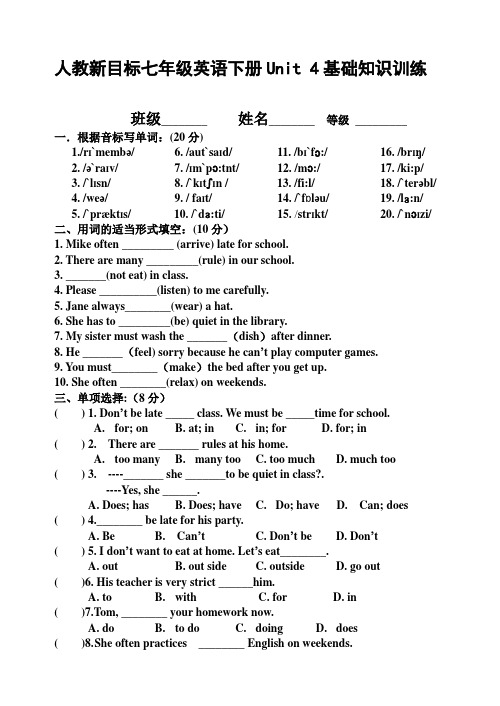
人教新目标七年级英语下册Unit 4基础知识训练班级________姓名________ 等级_________一.根据音标写单词:(20分)1./r I`membə/2. /ə`ra I v/3. /`l I sn/4. /weə/5. /`prækt I s/6. /aut`sa I d/7. /I m`pɔ:tnt/8. /`k I tʃI n /9. / fa I t/10. /`dɜ:ti/11. /b I`fɔ:/12. /mɔ:/13. /fi:l/14. /`fɒləu/15. /str I kt/16. /br Iŋ/17. /ki:p/18. /`terəbl/19. /lɜ:n/20. /`nɔI zi/二、用词的适当形式填空:(10分)1. Mike often _________ (arrive) late for school.2. There are many _________(rule) in our school.3. _______(not eat) in class.4. Please __________(listen) to me carefully.5. Jane always________(wear) a hat.6. She has to _________(be) quiet in the library.7. My sister must wash the _______(dish)after dinner.8. He _______(feel) sorry because he can’t play computer games.9. You must________(make)the bed after you get up.10. She often ________(relax) on weekends.三、单项选择:(8分)() 1. Don’t be late _____ class. We must be _____time for school.A. for; onB. at; inC. in; forD. for; in() 2. There are _______ rules at his home.A. too manyB. many tooC. too muchD. much too () 3. ----_______ she _______to be quiet in class?.----Yes, she ______.A. Does; hasB. Does; haveC. Do; haveD. Can; does () 4.________ be late for his party.A. BeB. Can’tC. Don’t beD. Don’t() 5. I don’t want to eat at home. Let’s eat________.A. outB. out sideC. outsideD. go out()6. His teacher is very strict ______him.A. toB. withC. forD. in()7.Tom, ________ your homework now.A. doB. to doC. doingD. does()8. S he often practices ________ English on weekends.A. speakB. speakingC. speaksD. to speak 四.选词填空(10分)There are many __1.__ at school. __2.__ school days, I must arrive at school __3.__ 7:00. At school, we can’t be noisy and we must __4.__ quiet. We have nine classes one day, but after school, we can’t __5.__ either. We have to clean our classroom before we __6.__. And we__7.__ do much homework in the evening. Rules, rules, rules! It’s __8.__. But my parents say, “Our teachers make rules to __9.__ us. We have to __10.__ them.”1-5 __________________; 6-10 __________________.五、句型转换:(20分)1. She has to do the dishes. (变为一般疑问句并做肯定回答)_______ she _______ ________ _______the dishes? _______, she_________.2 Tom has to wear his uniform to school.(变否定句)Tom ________ ______ to wear his uniform to school.3. Open the door, please. (变否定句)________ ________the door, please.4 .You can’t talk in class.(改为祈使句)________ _______ in class.5. Don’t clean the room now. (改为肯定句)______ the room now.6. Tom has to do his homework after school.(划线提问)_______ ______Tom ______ to ______ after school?7. They can sing English songs.(划线提问)______ _______ they ______ ?六.根据要求完成下列句子。
人教版(新目标)初中英语七年级下册Unit 4预习自学
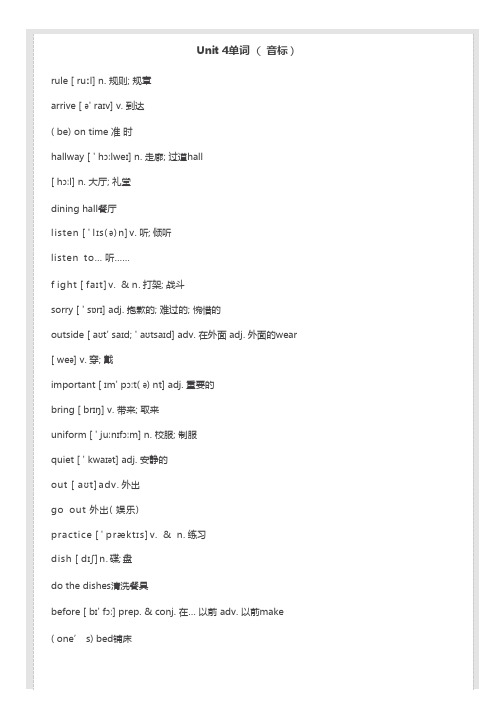
Unit 4单词(音标)rule [ ruːl] n. 规则; 规章arrive [ ə' raɪv] v. 到达( be) on time 准时hallway [ ' hɔːlweɪ] n. 走廊; 过道hall[ hɔːl] n. 大厅; 礼堂dining hall餐厅l isten [ ' l ɪs( ə) n] v. 听; 倾听l i sten to… 听……f ight [ faɪt] v.& n. 打架; 战斗sorry [ ' sɒrɪ] adj. 抱歉的; 难过的; 惋惜的outside [ aʊt' saɪd; ' aʊtsaɪd] adv. 在外面 adj. 外面的wear [ weə] v. 穿; 戴important [ ɪm' pɔːt( ə) nt] adj. 重要的bring [ brɪŋ] v. 带来; 取来uniform [ ' juːnɪfɔːm] n. 校服; 制服quiet [ ' kwaɪət] adj. 安静的out [ aʊt] adv. 外出go out 外出( 娱乐)practice [ ' præktɪs] v.& n. 练习dish [ dɪʃ] n. 碟; 盘do the dishes清洗餐具before [ bɪ' fɔː] prep. & conj. 在… 以前 adv. 以前make ( one’ s) bed铺床dirty [ ' dɜːtɪ] adj. 脏的kitchen [ ' kɪtʃɪn] n. 厨房more [ mɔː] adj. & pron. 更多的noisy [ ' nɒɪzɪ] adj. 吵闹的relax [ rɪ' læks] v. 放松; 休息read [ riːd] v. 读; 阅读terrible [ ' terɪb( ə) l ] adj. 非常讨厌的; 可怕的feel [ f iːl] v. 感受; 觉的strict [ strɪkt] adj. 严格的; 严厉的be strict ( with sb)( 对某人) 要求严格remember [ rɪ' membə]v. 记住; 记起follow [ ' fɒləʊ] v. 遵循; 跟随follow the rules遵守规则luck [ lʌk]n. 幸运; 运气keep [ kiːp] v. 保持; 保留hair [ heə] n. 头发; 毛发learn [ lɜːn] v. 学习; 学会Clark [ kla: k] 克拉克( 姓; 男名)Amy [ eɪmɪ] 埃米( 女名)Molly[' mɒlɪ] 莫莉( 女名)New York [ nju: jɔ: k] 纽约unit4课本教材Listezz. What rules axe chese xt«dents breaking? Write the zsuznbera aAcr tbe names.Peter Amy MikeStudent A in a new stude»n Stud B ent A: What arc the ml es?tella Student A about the rulea above. *' We 1, ^* *^" * •••'*° la*c f°rclass. ¥S'e must tie on Anne.Listen. Cbeck { ) tJze acttvttJes AMxt azzd Ctaéy taJJ¢ahout.Activity1.«•'*listen to music tn theclassroom or hallways2.listen to music in thecan can’tITIUSIC fOOIYI3. listen to music outside can can't4. eat in the classroom Caf›can t5. eat in the dininghall can can't6. eatoutside can can't7. wearahat can can’t8. fight can can’ttbese activities? Ctrct ” core or czzsf*¢aboveStudozzt A is Alaa aad Studezst B 1sCfncfp. Talk about che Mes in 2a.Role-play ghe corsveruagioxx.John: I li, my names Jo hn. It's my first day at school.dlice: Hi, John. I’m Alice. ’I liix is a great schocil, but there are a lot of rules. John:Really?that are some of the rules°Alice: ¥$'c11, dun‘t be late f‹ir cla.ss. This is very important.John: OK, so we tz ust be a»time. lan we bring music gIay«rv to schuo1? Alice: No, we can’t. And we always have to «'ear the school uniform.John: 1 see.Alice: Oh, and we atso hax•e to be quiet in the library.t«emeeeez«c nD n'(e [j)'j [ $ c s cc •••v•« v « o« cc « n c n » » c c c c c n c nc nm m+ #§# #m«+++«***.Don’t run in th/èhallways.What are the rules.+Carl we eat in the c lassroomCari we wear a hat in c lass*Does he have to wear a uniform at school ? What do. you have to dokWrite khe rules for the school l ibrary.Don’t light.We’ must be ön time for class. No. we can‘1, büt. we cän eaïin the dining hall.\ës, we can./No. we can't.Y es. he does./No. he doesn*t.We have to be quièt.in the libraiy,Usethewords to make qucstionx about the rules. then x••rite nnswers 0Does she have to be quiet ‹n †he library* (3he/bve to,’ü› d c ÏiL›rary)? A: Y . shs does.A:1istrn to music *(we/c.an lin the h.allivays) *0.Make up five cool rules for your dream whoril. Share your rules with the claas. Y•sur clm*smates vote for the Cwoleet School?l . \Ve can cut in class. ,2. 't¥'e doii’t lIax c-c te truc te› schunl every da)v-.Read the z•uIes in the chazt En 1b. Neo azaccb cbeRulex Can’t(')a . gu uutse+' friendsda his nomew'Orkp actice the quitar‹!o thee disheswatr.h TVhe p h:'s mom make bleak tart ash s oo x on school nigh†sE,lsten agatn. Write wlzeo Dave Rae to /oIfow Ebe cuJea isz the chart In 1b. Cboose fñoczs tbc pkxases tza thee boz.on schonl nights every Saturday befc re dinner in lhe evening rin schc›nl days.after dinner after school every m orningTallc ahozst the x"nIes to Daea'é botzac.Unit4 知识梳理◆短语归纳1.on time 准时,按时2.listen to… 听……3.in class 在课上4.be late for 做……迟到5.have to 不得不6.be quiet 安静7.go out 外出8.do the dishes 清洗餐具9.make breakfast 做早饭10.make (one’s) bed 铺床11.be noisy 吵闹12.keep one’s hair short 留短发13.play with sb. 和某人一起玩14.play the piano 弹钢琴15.have fun 玩得高兴16.make rules 制订规则◆用法集萃1.Don’t + 动词原形+其他。
新目标七年级下册英语Unit4基础知识专练及答案
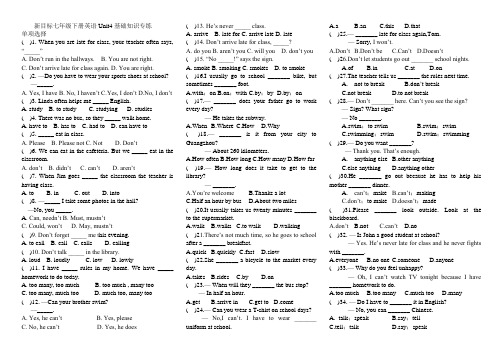
新目标七年级下册英语Unit4基础知识专练单项选择( )1. When you are late for class, your teacher often says, “_____”A. Don’t run in the hallways.B. You are not right.C. Don’t arrive late for class again.D. You are right. ( )2. —Do you have to wear your sports shoes at school?—_____.A. Yes, I haveB. No, I haven’tC.Yes, I don’tD.No, I don’t ( )3. Linda often helps me _____ English.A. studyB. to studyC. studyingD. studies ( )4. There was no bus, so they _____ walk home.A. have toB. has toC. had toD. can have to( )5. _____ eat in class.A. PleaseB. Please notC. NotD. Don’t( )6. We can eat in the cafeteria. But we _____ eat in the classroom.A. don’tB. didn’tC. can’tD. aren’t( )7. When Jim goes _____ the classroom the teacher is having class.A. toB. inC. outD. into( )8. —_____ I take some photos in the hall?—No, you _____.A.Can, needn’tB. Must, mustn’tC. Could, won’tD. May, mustn’t( )9. Don’t forget _____ me t his evening.A. to callB. callC. callsD. calling( )10. Don’t talk _____ in the library.A. loudB. loudlyC. lowD. lowly( )11. I have _____ rules in my home. We have _____ homework to do today.A. too many, too muchB. too much , many tooC. too many, much tooD. much too, many too ( )12. —Can your brother swim?—_____.A. Yes, he can’tB. Yes, pleaseC. No, he can’tD. Yes, he does ( )13. He’s never _____ class.A. arriveB. late forC. arrive lateD. late( )14. Don’t arrive late for class, _____?A. do youB. aren’t youC. will youD. don’t you( )15. “No _____!” says the sign.A. smokeB. smokingC. smokesD. to smoke( )16.I usually go to school _______ bike, butsometimes _______ foot.A.with;onB.on;withC.by;byD.by;on( )17.—_______ does your father go to workevery day?— He takes the subway.A.WhenB.WhereC.HowD.Why( )18.—_______ is it from your city toGuangzhou?— About 260 kilometers.A.How oftenB.How longC.How manyD.How far( )19.—How long does it take to get to thelibrary?— _______.A.You’re welcomeB.Thanks a lotC.Half an hour by busD.About two miles( )20.It usually takes us twenty minutes _______to the supermarket.A.walkB.walksC.to walkD.walking( )21.There’s not much time, so he goes to schoolafter a _______ breakfast.A.quickB.quicklyC.fastD.slow( )22.She _______ a bicycle to the market everyday.A.takesB.ridesC.byD.on( )23.— When will they _______ the bus stop?— In half an hour.A.getB.arrive inC.get toe( )24.— Can you wear a T-shirt on school days?—No,I can’t. I have to wear _______uniform at school.A.aB.anC.thisD.that( )25.— _______ late for class again,Tom.— Sorry, I won’t.A.Don’tB.Don’t beC.Can’tD.Doesn’t( )26.Don’t let students go out _______ school nights.A.ofB.inC.atD.on( )27.The teacher tells us _______ the rules next time.A.not to breakB.don’t breakC.not breakD.to not break( )28.—Don’t _______ here. Can’t you see the sign?— Sign? What sign?— No _______.A.swim;to swimB.swim;swimC.swimming;swimD.swim;swimming( )29.— Do you want _______?—Thank you. That’s enough.A.anything elseB.other anythingC.else anythingD.anything other( )30.He _______ go out because he has to help hismother _______ dinner.A.can’t;makeB.can’t;makingC.don’t;to makeD.doesn’t;made( )31.Please _______ look outside. Look at theblackboard.A.don’tB.notC.can’tD.no( )32. — Is John a good student at school?—Yes. He’s never late for class and he never fightswith _______.A.everyoneB.no oneC.someoneD.anyone( )33.— Why do you feel unhappy?—Oh, I can’t watch TV tonight because I have_______ homework to do.A.too muchB.too manyC.much tooD.many( )34. — Do I have to _______ it in English?— No, you can _______ Chinese.A.talk;speakB.say;tellC.tell;talkD.say;speak( )35.This light music makes me _______.A.relaxB.relaxedC.relaxingD.to relax词汇运用1.My father usually a (到达) at his office at 7:10 a.m.2.Lucy p (练习) swimming every weekend. 3.The two blue d (盘子) are very nice. I like them very much.4.Mom is cooking lunch in the k (厨房).5.—How is your English test(测验)?—It's t (糟糕的).6. In Beijing, Mr. Green has ____________(许多) friends.7. Where’s my ____________(校服), Mom?8. Don’t ____________(迟到) class, Jane.9. In Bob’s room I see some new ____________(音乐播放器).10. Jack ____________(不得不) clean his room every day.11. Mr. Jones has many _________(规则) in his sports club.12. Usually Ms. Clark _________(到达) at school very early.13. At school Simon never _________(打架) with his classmates.14. I’m _________(抱歉的) I can’t help you with your math.15. Many students are in the _________(走廊).16. _________(听) me! We don’t have much time.17. Come on, Alice! We must get to school _________(按时).18. —Where’s Jane?—She’s in the _________(餐厅).19. —Your room is very d .—I know. I’ll clean it.20. Every weekend Jerry r books in the library.21. —How do you f about seeing your old friends? —Very happy.22. —I have an English test on Tuesday.—Good l to you. 23. —I lost my pencil box.—That’s t .用所给单词的适当形式完成句子1.Tony (not have) to go toschool every day.2.Too many (rule) make Molly feelterrible.3.Please don't be (noise).The baby issleeping.4.I have a (relax) weekend.5.Parents and schools make rules(help) students.6. How many _________(kitchen) can you see inthis picture?7. Every evening Jeff _________(relax) one hourafter dinner.8. Please _________(remember) to bring my CDplayer to me after school.9. What color is Kate’s _________(hair)?10. You must _________(keep) your room clean.根据汉语意思完成句子1.琳达睡觉前经常听音乐。
七年级英语Unit 4Where is my backpack 人教版(新目标)知识精讲
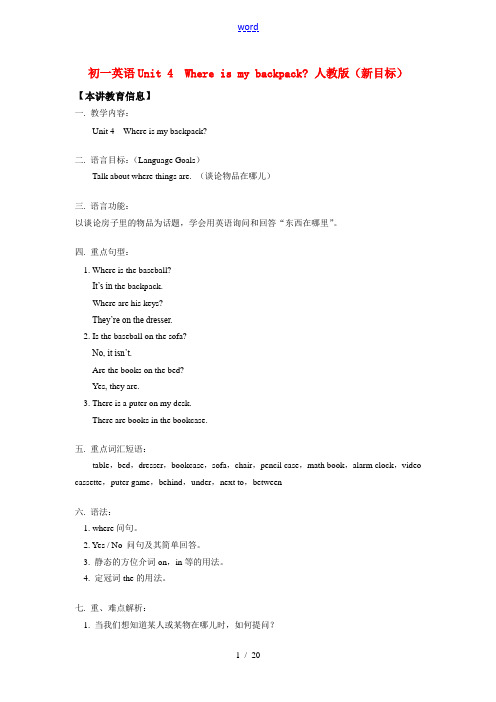
初一英语Unit 4 Where is my backpack? 人教版(新目标)【本讲教育信息】一. 教学内容:Unit 4 Where is my backpack?二. 语言目标:(Language Goals)Talk about where things are. (谈论物品在哪儿)三. 语言功能:以谈论房子里的物品为话题,学会用英语询问和回答“东西在哪里”。
四. 重点句型:1. Where is the baseball?It’s in the backpack.Where are his keys?They’re on the dresser.2. Is the baseball on the sofa?No, it isn’t.Are the books on the bed?Yes, they are.3. There is a puter on my desk.There are books in the bookcase.五. 重点词汇短语:table,bed,dresser,bookcase,sofa,chair,pencil case,math book,alarm clock,video cassette,puter game,behind,under,next to,between六. 语法:1. where问句。
2. Yes / No 问句及其简单回答。
3. 静态的方位介词on,in等的用法。
4. 定冠词the的用法。
七. 重、难点解析:1. 当我们想知道某人或某物在哪儿时,如何提问?Where is / are + … ?当我们想知道某个物品在哪儿时,我们通常用Where is / are … ?句型来提问。
如:Where is my backpack?△where 是疑问副词,意思是在哪里,后面用一般疑问句句型。
△当询问的物品数量为单数时,其前的be 动词应使用is ,因为该物品在问句中提到过,所以回答时用代词it 代替该物品。
七年级下册英语Unit4知识点总结

七年级下册英语Unit4知识点总结Unit4的主题是“School clubs”,学生们可以学习有关学校俱乐部的词汇和短语。
在这个单元中,学生们将会学习如何表达他们喜欢的俱乐部并加入。
下面是Unit4的重点内容总结。
1. 表示自己喜欢的俱乐部当学生们被问到是否喜欢某个俱乐部时,正确的表达方法应该是:“I like (club name)。
”其中,“club name”可以替换为具体的俱乐部名称。
例如:I like chess club. (我喜欢国际象棋俱乐部。
)2. 加入俱乐部当学生们想要加入某个俱乐部时,应该使用“join”这个动词。
正确的表达方法应该是:“I want to join (club name)。
”例如:I want to join soccer club. (我想加入足球俱乐部。
)3. 描述俱乐部的活动当学生们谈论俱乐部的活动时,可以使用以下短语:- We have meetings. (我们有会议。
)- We practice on (day of the week). (我们在(星期几)练习。
) - We play games. (我们进行比赛。
)例如:We have meetings on Wednesday and Friday. (我们在星期三和星期五举行会议。
), We practice on Fridays. (我们在星期五练习。
)4. 提出建议当学生们想要提出某个俱乐部的建议时,可以使用以下句式:- We should (verb) (club name).例如: We should advertise chess club more. (我们应该更多地宣传国际象棋俱乐部。
)- Why don't we (verb) (club name)?例如: Why don't we organize a tournament for soccer club? (为什么我们不为足球俱乐部组织一次比赛呢?)5. 其他词汇和短语除了以上内容,Unit4中还包括了以下其他词汇和短语:club meeting(俱乐部会议)、club practice(俱乐部练习)、club tournament(俱乐部比赛)、science club(科学俱乐部)、photography club(摄影俱乐部)等等。
2020七年级英语下册 Unit 4 Don’t eat in class短语、语法知识点汇总 (新版)人教新目标版
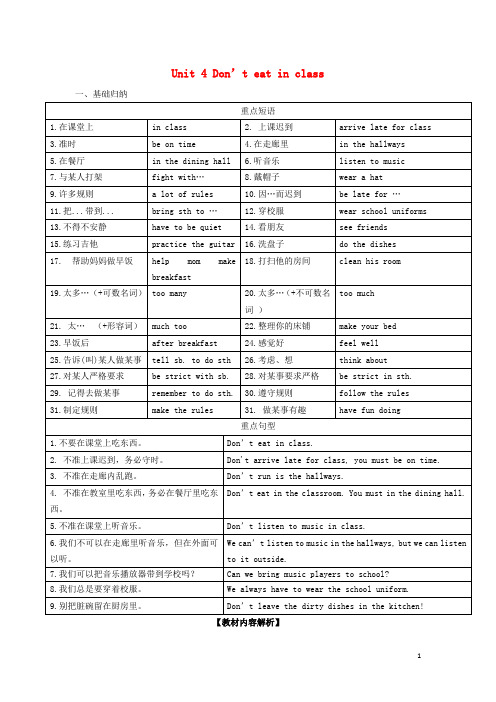
Unit 4 Don’t eat in class 一、基础归纳【教材内容解析】Section A1.Don’t arrive late for class. (P. 19)arrive作不及物动词,表示“到达”,接宾语时,需要加上介词in或者at。
When did you arrive?We are arriving at the station at two o’clock.【拓展】reach表示“到达”时,是及物动词,后面直接接表示地点的名词作宾语。
另外两个表示“到达”的动词(get和arrive)都是不及物动词,get to+地点;arrive in/at+地点。
After a long way, they reached/got to/arrived at the top of the mountain finally.2.You must be on time. (P. 19)on time用作固定短语,表示“准时、按时”,in time表示“及时”。
The train arrives on time.The ambulance(救护车) arrives in time.3.Don’t listen to music in class. (P. 19)listen用作不及物动词,表示听的动作,后接宾语时,需要加上介词to,hear强调听的结果,表示“听到”。
This girl likes to listen to music.Can you hear anything?4.Don’t fight. (P. 19)fight此处用作动词,意为“打架”,fight with sb.意为“与某人打架”。
Why do you sometimes fight with others?5.listen to music outside (P. 20)outside表示“在外边”,反义词为inside“在……里面”。
新目标英语七年级(下)Unit4知识要点归纳总结
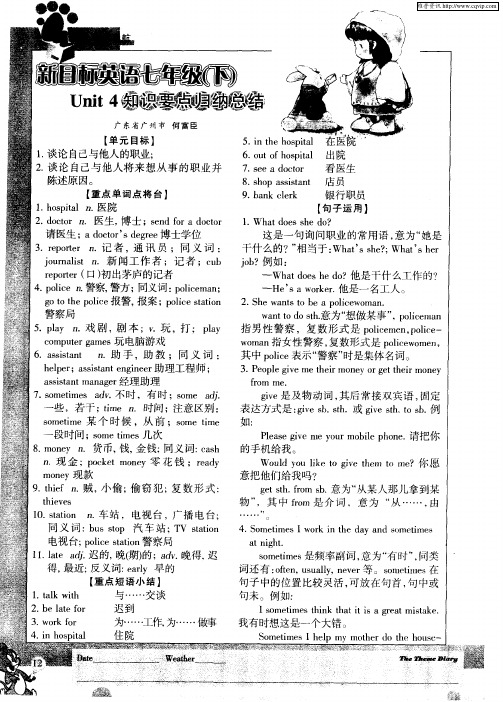
… …
9 ti . , 偷 ; 窃 犯 ; 数 形 式 : .he n 贼 小 f 偷 复
tiv s he e
1.t i n 车站 ,电视 台 ,广播 电 台; 0 stn . ao 同 义 词 : u tp 汽 车 站 ; V s t n b ss o T ti ao 电视 台; oc tin 察局 pl es t 警 i ao I.ae aj 迟 的, I 1 d. t ' 晚 ) ;a 晚 得, 的 . 迟 得, 最近; 义词 : al 早 的 反 er y 【 点短 语小结 】 重 1 t kwt .a i l h 与 ……交 谈
Pes ieneyu oi hn. laeg l or bl poe 请把 你 v m e 的手机 给我 。 W o 给我u l o i e ?你 ud y i v h k 意把他们l o吗?e t g et m t m s 意为 “ 某 人那儿拿 到某 h r b 从 物” ,其 中 f m 是 介 词 .意 为 “ … … , r o 从 由
维普资讯
目
Un t4 i
广 东省广 州市 何 富 臣
5 nte .i h 【 单元 目标】 6.o to o pi l 出院 u fh s t a 1谈 论 自己与他人 的职业; . 2 谈论 自己与他人将来 想从 事的职业并 7. e o tr . s e a d co 看 医生 陈述 原 因。 8. h p a ssa t s o s itn 店员 【 重点 单词点 将 台】 9 a k ce k .b n l r 银行 职员 1 hs i l/ 医 院 . opt / a . 【 句子运 用 】 .W a o ss e d ? 2 dco / . ot / r .医生 , 士 ;sn r otr 博 edf dc 1 h td e h o oa o 请医生 ; ot ’ dge 博士学位 a c rs er d o e 这是一句询问职业的常用语 , 意为“ 她是 3 r o e . 者 , 讯 员 ;同 义 词 : 干什么的?” .e rr 记 p t n 通 相当于 : a’ se; a’ hr Wht ?Wht e sh s i ras .新 闻工 作 者 ;记 者 ;cb o nlt u i n u jb 如 : o?例 rprr( 初 出茅庐 的记者 eo e 口) t wht os ed?他是 干什 么工作 的? ade o h H e’ r e 他 是一名 工人 。 S a wo k r 4 pl en警察, . oc . i 警方 ; 同义词 : o cm n ple a ; i g epl e ot t oc 报警, oh i 报案 ; oi tin ples t 2. ewa t o b o ie ma . c ao Sh n st e a p l wo n c 警察局 w n o t. atod h意为“ t s 想做 某事 ” p l e a , oi m n c 5 ly . 剧 , 本 ; 玩 , ; pa 指男性警察 ,复数形式是 pl e e ,oo— .pa n 戏 剧 打 ly ocm npl e i i cm ue a e 玩 电脑游戏 o ptr m s g w m n 女性 警察 , oa指 复数形 式 是 ple 0 e , ocw m n i 6 as tn . sia t n s .助 手 ,助 教 ;同 义 词 : 其 中 ple 示“ oc表 i 警察 ” 是集 体名 词 。 时 h le ; si at n ier 理工程 师 ; epr as t gn e 助 sn e 3.P o egv et ermo e rg tt ermo e e pl i em h i n yo e h i n y
人教版新目标初一下册英语unit4知识点

Unit 4 Don’t eat in class.一、知识概述1.学习和掌握情态动词can和have to的用法。
2.学习和掌握祈使句的含义和用法。
3.学会谈论规则。
二、语音知识三、单元重难点解析1.Don't run in the hallways.别在走廊里跑。
这是一个祈使句。
祈使句是用来表示请求、命令、劝告等的句子,通常省略主语you。
它的谓语动词用祈使语气(即动词原形)。
句尾一般用降调。
祈使句有肯定和否定两种。
e in, please! 请进!Sit down, please. 请坐。
Let's go home. 我们回家吧。
否定的祈使句是在动词前(即句首)加Don’t。
e.g.Don’t talk in class!不要在课常上讲话!Don’t open the window!别开窗!Don’t be late for school.上学别迟到。
Don’t listen to music in class.课堂上不要听音乐。
2.Don’t arrive late for class. You must be on time.[译文]上学不要迟到。
你必须准时到校。
(1)arrive是不及物动词,不能直接跟表示地点的名词。
如果要跟名词,就必须加介词in或at。
at后接小地点,in后接大地点。
e.g.We will arrive at the village at 5 tomorrow afternoon.我们将明天下午5点到达这个村子。
How will you arrive in Shanghai?你们将如何到达上海?注意:如果arrive后不接名词,就不用介词:e.g.After you arrive (here/there), please call me.你到了(这里/那儿)后给我打个电话。
(2)late adj. & adv. 迟,晚e.g.Why are you late?你为什么迟到?Sorry, I come late.对不起,我来晚了。
Unit4知识点整理人教版七年级英语下册
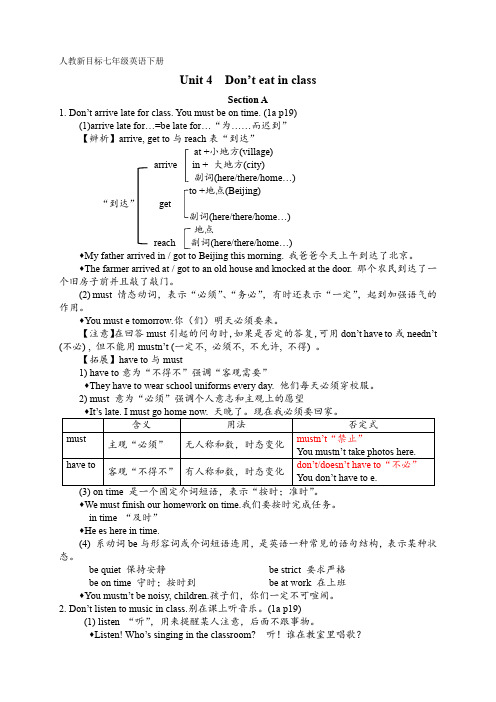
人教新目标七年级英语下册Unit 4 Don’t eat in classSection A1. Don’t arrive late for class. You must be on time. (1a p19)(1)arrive late for…=be late for…“为……而迟到”【辨析】arrive, get to与reach表“到达”at +小地方(village)arrive in + 大地方(city)副词(here/there/home…)to +地点(Beijing)“到达”get副词(here/there/home…)地点reach 副词(here/there/home…)My father arrived in / got to Beijing this morning.我爸爸今天上午到达了北京。
The farmer arrived at / got to an old house and knocked at the door.那个农民到达了一个旧房子前并且敲了敲门。
(2) must 情态动词,表示“必须”、“务必”,有时还表示“一定”,起到加强语气的作用。
You must e tomorrow.你(们)明天必须要来。
【注意】在回答must引起的问句时,如果是否定的答复,可用don’t have to或needn’t (不必) , 但不能用mustn’t (一定不, 必须不, 不允许, 不得) 。
【拓展】have to与must1) have to意为“不得不”强调“客观需要”They have to wear school uniforms every day. 他们每天必须穿校服。
2) must 意为“必须”强调个人意志和主观上的愿望We must finish our homework on time.我们要按时完成任务。
in time “及时”He es here in time.(4) 系动词be与形容词或介词短语连用,是英语一种常见的语句结构,表示某种状态。
新目标英语七年级(下)Unit4知识要点归纳

fight
打架;战斗
important 重要的
practice
Байду номын сангаас
练习
relax 放松;休息
remember 记住;记起
learn 学习;学会
arrive late for class 上课迟到 listen to music 听音乐
cn. All RdfioolglothhwettdshieshrReuesles清se遵洗r守v餐e规具d则.
二尧重点词组
be quiet in the library 在图书馆保持安静 be strict with sb. 对某人要求严格 make one’s bed 铺床 wear a uniform 穿校服
三尧重点难点分析
Don爷t arrive late for class. 上课别迟到遥 银1. 此句为否定的祈使句。祈使句是表示请求、命令、叮嘱、号召、劝告等的句子,通常 省略主语 you,谓语动词用动词原形,句尾一般用降调。祈使句有肯定和否定两种。肯定祈 使句通常以动词原形开头,否定祈使句则是在动词原形前加上 don’t。例如: Keep quiet, please. Don’t talk in class. 请保持安静。不要在课堂上讲话。 银2. 句中 arrive 为不及物动词,意为“到达”,其后不能直接跟表示地点的名词。如果要 跟名词,就必须在名词前加上介词 in 或 at。一般来说,in 用在城市、国家等大地点前,而 at 则用在小地点前。例如: When did they arrive in Wuhan? 他们是什么时候到达武汉的? Matthew arrived at No. 45 Middle School yesterday. 马修昨天抵达了第 45 中学。
新版新目标英语七年级下册unit4知识点总结

unit 4 Don ’ t eat in class.Section A1. arrive late for 迟到,重视抵达的时间晚be late for 迟到重视于状态arrive late for class/school. = be late for class/school. 上课 /上学迟到2. on time 准时按规准时间或指准时间做某事不早不晚in time 实时不迟到或在规准时间以前或靠近所规准时间做某事没有迟到,时间还丰裕He always go to school on time他.老是准时上学。
Fireman reached the house on fire in time消.防员实时赶到那幢失火的房屋。
3. 祈使句表示恳求,命令或建议祈使句无主语,主语 you 常省去,动词原形谓语当 ,句首加 don’t否认变朗诵应该用降调 ,句末常标叹息号。
一定的祈使句(1)实义动词原形 +其余Have a seat here. 请这边坐。
(2)be 动词原形 +形容词 +其余Be a good boy!(3)Let sb do sth. Let me help you. 让我来帮你。
(4)有的祈使句在乎思明确的状况下,动词可省略。
This way, please. = Go this way, please.请这边走否认的祈使句(1)Don’ t+实义动词 +原形Don’ t forget me! 不要忘掉我 !(2)Don ’ t be+形容词 +其余Don’ t be late for school! 上学不要迟到 !(3) Don ’e t lsb do sth Let +宾语 + not + 动词原形 +其余成分Don’ t let him go. / Let him not go. 别让他走。
(4) No+Ving. No smoking! 严禁抽烟 ! No fishing! 严禁垂钓4.hear listen sound 听hear听闻重视于听的内容I'm sorry to hear that you are ill. 听闻你患病了我很悲伤。
- 1、下载文档前请自行甄别文档内容的完整性,平台不提供额外的编辑、内容补充、找答案等附加服务。
- 2、"仅部分预览"的文档,不可在线预览部分如存在完整性等问题,可反馈申请退款(可完整预览的文档不适用该条件!)。
- 3、如文档侵犯您的权益,请联系客服反馈,我们会尽快为您处理(人工客服工作时间:9:00-18:30)。
新目标英语七年级(下)Unit 4 Don’t eat in class.基础知识与重点归纳总结
不要在课堂上吃东西。
Section A (1a-1c) 短语归纳P19
1.school rules 校规
2.be/arrive late for class 上课迟到
3.on time 准时
4.in the hallways 在走廊里
5.in the dinning hall 在餐厅/食堂
6.listen to music 听音乐
7. in class 在课堂上
Section A (1a-1c) 句子语法归纳P19
1. Don’t arrive late for class.不要上课迟到。
arrive /get to / reach 都有“到达”的意思,后面常跟地点(注意:arrive后也可以不跟地点)①arrive in + 大地点They arrived in Beijing at six. 他们六点钟到的北京。
arrive at + 小地点We usually arrive at the school at 8:30.我们通常8:30到学校。
②get to + 地点名词get to school 到学校get + 地点副词get home 到家
③reach + 地点I reached Beijing yesterday. 我昨天到达北京。
2. Don’t fight.不要打架。
fight with sb.和某人打架Bob never fights with his brother. 鲍勃从来不和他弟弟打架。
Section A (2a-2d) 短语归纳P20
1. eat outside 下馆子(在外出吃)
2.wear a hat 戴一顶帽子
3. be/arrive late for class 上课迟到
4. on time 准时
5. music player 音乐播放器
6. have to 不得不
7. wear the/a school uniform 穿校服8. I see 我明白了
9. be/keep quiet 保持安静10. in the library 在图书馆里
Section A (2a-2d) 语法归纳P20
1. ①….So we must be on time. 所以我们必须要按时。
②And we always have to wear the school uniform. 而且我们总是不得不穿校服。
have to着重于客观的需要,含有“不得不”的客观强制性;must着重于主观上自己认为有义务、有必要。
如:①She has to clean the room every week. 她每周都得打扫房间。
②I must go now. 我现在必须走。
含有have to的句子变一般疑问句或否定句时要借助助动词do / don’t或does / doesn’t;而含有must的句子变一般疑问句是直接将must提前至句首,变否定句是在must后加not。
如:He doesn’t have to do it. 他不必做那件事。
He mustn’t do it. 他不许做那件事。
①He has to wear the school uniform at school. (改为一般疑问句)
_____ he ______ ____ wear the school uniform at school?
②We must finish our work now. (改为一般疑问句)
______ we ________ our work now?
在否定句中,don’t / doesn’t have to表示“没有必要”,must not / mustn’t表示“不允许,禁止”。
如:She doesn’t have to go there. 她不必去那儿。
You must not / mustn’t go there. 你不许去那儿。
Section A (Grammar Focus -3c) 短语归纳P21
1. at school 在学校
2. come to school 来到学校
3. every day 每天
Section A (Grammar Focus -3c) 句子语法归纳P21
—What do you have to do?你们不得不做什么?
—We have to be quiet in the library. 我们不得不在图书馆保持安静。
Section B (1a -1e) 短语归纳P22
1. go out 外出
2. on school nights 在校期间的晚上
3. see friends 看朋友
4. practice the guitar 练习吉他
5. do the dishes 洗盘子
6. watch TV 看电视
7. help mom make breakfast 帮助妈妈做早饭8. clean the room 打扫房间
9. every Saturday 每个星期六10. before dinner 晚餐前
11. on school days 在上学日12. after dinner 晚饭后
13. after school 放学后14. at night 在晚上
15. every morning 每天早上
Section B (1a -1e) 语法归纳P23
1. practice 练习practice doing sth. 练习做某事
I practice listen ing to English words. 我每天练习听英语单词。
Section B (2a -2c) 短语归纳P24
1. too many rules 太多的规则
2. make the/one’s bed 铺床
3. in the kitchen 在厨房里
4. more rules 更多的规则
5. make rules 制定规则
6. follow the rules 遵守规则/纪律
Section B (2a -2c) 句子语法归纳P24
1.After dinner, I can’t relax either. 晚饭后我也不能轻松。
副词either表示“也”,用于否定句句末。
如:My father can’t speak English. My mother can’t spea k it either.
我爸不会讲英语,我妈也不会。
2. There are a lot of things you can do.
有许多事情你可以做。
3. Parents and schools are sometimes strict,……父母和学校有时很严格
be strict with sb. 对某人严格
如:Our teacher is strict with us. 老师对我们很严格。
Section B (3a –self check)短语句子归纳P25
1. keep my hair short留短发
2.learn to play the piano 学会弹钢琴
keep + adj.(形容词) 保持…状态learn to do sth. 学会做某事
keep quiet 保持安静I learn to sing English songs. 我学会了唱英文歌。
